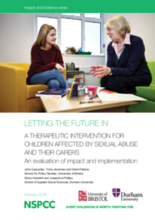Abstract
This independent report, from University of Bristol and Durham University, draws on information from the largest randomised controlled trial of a service for children affected by sexual abuse. It provides evidence about what works well in the service and what works less well. This report is part of our Impact and evidence series.
Executive Summary
Letting the Future In is a structured guide to therapeutic intervention with children affected by sexual abuse. The guide was developed by the NSPCC and has been implemented by 20 NSPCC teams across England, Wales and Northern Ireland since 2011. It is available to children aged between four and 17 who have made a disclosure and experienced sexual abuse, live with a safe carer with no planned moves and have no diagnosed learning disability.
Letting the Future In is grounded in an understanding of trauma, attachment and resilience. It is largely psychodynamic in nature and emphasises the therapeutic attunement of the practitioner to the child’s emotional responses to abuse, which typically include betrayal, powerlessness, shame and traumatic sexualisation. It sees the therapeutic relationship between child and practitioner as ‘core’ and employs creative therapies with work on the awareness and management of feelings. It also draws on other methods including counselling and socio-educative approaches. Children receive up to four therapeutic assessment sessions followed by up to 20 intervention sessions, extended up to 30 if necessary. At the same time, their safe carer is offered up to eight sessions to help them process the impact of discovering that their child was sexually abused, and to support the child in their recovery.
There are few rigorous evaluations of therapeutic interventions for these children. Recognising that Letting the Future In is new and untested, the NSPCC commissioned a process and impact evaluation from the universities of Bristol and Durham.

